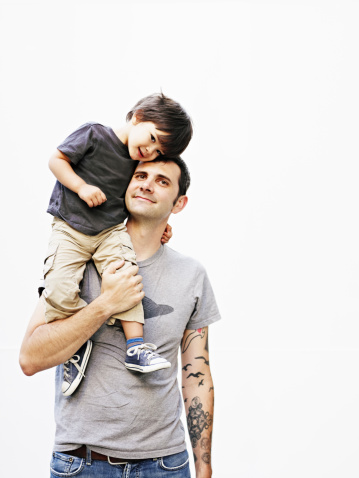 In my role as neutral child specialist I often act as a translator. I work to ensure that parents understand the words and ideas of their children about how family can work best for them moving forward. I help parents listen to rather than react to each other while working on creating a parenting plan. And I frequently deconstruct and revise certain legal divorce terminology into more family-friendly language.
In my role as neutral child specialist I often act as a translator. I work to ensure that parents understand the words and ideas of their children about how family can work best for them moving forward. I help parents listen to rather than react to each other while working on creating a parenting plan. And I frequently deconstruct and revise certain legal divorce terminology into more family-friendly language.
From the start, I ask my adult clients to think of and refer to themselves as
parents rather than
parties. The term
parties to a dispute in a no fault divorce is more impartial than
plaintiff vs. defendant, but it can still sound adversarial to many parents. As I have written before, legal terms like physical custody, legal custody, child support calculator and even settlement sound formal, top down and foreign to how families actually function. In my office, and in the offices of many
Collaborative team professionals, we talk about parenting time and decision making, and the resources parents need to adequately meet their children’s needs in both homes.Since learning this priceless phrase from a child I worked with, I prefer the term
getting unmarried to getting divorced.
I prefer talking about reaching
resolutions rather than
settlements. I ask my clients to refrain from saying
50/50 parenting, because how often do kids think of their parents in percentages?
I remind parents that children think of their moms as 100% their moms, and their dads as 100% their dads, regardless of whether the kids are at school, with their grandparents, on a play date, or where they sleep at night. We use the language of co-parenting that is developmentally informed and attuned to their children’s temperaments and personalities.
Language powerfully shapes our human experience, and communicates both explicit and implicit meaning. The words chosen to describe a process or event are important. Discussing important concepts in clear, thoughtful, straight-forward language and avoiding the use of jargon whenever possible can promote clarity and understanding during an already anxiety-arousing process.
And that is also priceless.
 In a recent first meeting with new clients, I was obtaining family history to help ground me in both parents’ perspectives on issues related to their divorce. A comment by the dad struck a chord for me. He said, “I believe the way I can become the best parent to my child is by getting a divorce.”
At first glance this comment seems counter-intuitive. Most children would prefer their parents remain married or partnered and under one roof. Divorce is usually a life crisis for children and their parents. Divorce is necessarily about grief and loss. How does it follow that a divorce can result in better parenting?
The answer is that many parents whose marriages don’t work are able to enter into a co-parenting relationship that does work. In these families, children remain at the center of their parents’ concern and out of the middle of their parents’ conflicts. Especially if the decision to get unmarried is mutual, and a reservoir of trust and good will about parenting has been preserved, it can relieve a great deal of stress in the home to decide (though often with great sadness) to let go of the marriage while embracing a new lifelong role as co-parents. Children can continue to feel safe and loved in the context of a healthy co-parenting relationship. Effective co-parents are mindful and committed to being present for and attuned to the needs of their children, and this is the foundation of their children’s resilience and hope.
Collaborative Team Practice offers specialized mental health resources to support and reinforce healthy and effective co-parenting during and after a divorce. Neutral child specialists and neutral coaches help parents create Parenting Plans and Relationship Plans as detailed and unique guides for positive co-parenting. It is indeed possible to divorce with the goal of becoming the best parent one can be.
In a recent first meeting with new clients, I was obtaining family history to help ground me in both parents’ perspectives on issues related to their divorce. A comment by the dad struck a chord for me. He said, “I believe the way I can become the best parent to my child is by getting a divorce.”
At first glance this comment seems counter-intuitive. Most children would prefer their parents remain married or partnered and under one roof. Divorce is usually a life crisis for children and their parents. Divorce is necessarily about grief and loss. How does it follow that a divorce can result in better parenting?
The answer is that many parents whose marriages don’t work are able to enter into a co-parenting relationship that does work. In these families, children remain at the center of their parents’ concern and out of the middle of their parents’ conflicts. Especially if the decision to get unmarried is mutual, and a reservoir of trust and good will about parenting has been preserved, it can relieve a great deal of stress in the home to decide (though often with great sadness) to let go of the marriage while embracing a new lifelong role as co-parents. Children can continue to feel safe and loved in the context of a healthy co-parenting relationship. Effective co-parents are mindful and committed to being present for and attuned to the needs of their children, and this is the foundation of their children’s resilience and hope.
Collaborative Team Practice offers specialized mental health resources to support and reinforce healthy and effective co-parenting during and after a divorce. Neutral child specialists and neutral coaches help parents create Parenting Plans and Relationship Plans as detailed and unique guides for positive co-parenting. It is indeed possible to divorce with the goal of becoming the best parent one can be.  In a recent first meeting with new clients, I was obtaining family history to help ground me in both parents’ perspectives on issues related to their divorce. A comment by the dad struck a chord for me. He said, “I believe the way I can become the best parent to my child is by getting a divorce.”
At first glance this comment seems counter-intuitive. Most children would prefer their parents remain married or partnered and under one roof. Divorce is usually a life crisis for children and their parents. Divorce is necessarily about grief and loss. How does it follow that a divorce can result in better parenting?
The answer is that many parents whose marriages don’t work are able to enter into a co-parenting relationship that does work. In these families, children remain at the center of their parents’ concern and out of the middle of their parents’ conflicts. Especially if the decision to get unmarried is mutual, and a reservoir of trust and good will about parenting has been preserved, it can relieve a great deal of stress in the home to decide (though often with great sadness) to let go of the marriage while embracing a new lifelong role as co-parents. Children can continue to feel safe and loved in the context of a healthy co-parenting relationship. Effective co-parents are mindful and committed to being present for and attuned to the needs of their children, and this is the foundation of their children’s resilience and hope.
Collaborative Team Practice offers specialized mental health resources to support and reinforce healthy and effective co-parenting during and after a divorce. Neutral child specialists and neutral coaches help parents create Parenting Plans and Relationship Plans as detailed and unique guides for positive co-parenting. It is indeed possible to divorce with the goal of becoming the best parent one can be.
In a recent first meeting with new clients, I was obtaining family history to help ground me in both parents’ perspectives on issues related to their divorce. A comment by the dad struck a chord for me. He said, “I believe the way I can become the best parent to my child is by getting a divorce.”
At first glance this comment seems counter-intuitive. Most children would prefer their parents remain married or partnered and under one roof. Divorce is usually a life crisis for children and their parents. Divorce is necessarily about grief and loss. How does it follow that a divorce can result in better parenting?
The answer is that many parents whose marriages don’t work are able to enter into a co-parenting relationship that does work. In these families, children remain at the center of their parents’ concern and out of the middle of their parents’ conflicts. Especially if the decision to get unmarried is mutual, and a reservoir of trust and good will about parenting has been preserved, it can relieve a great deal of stress in the home to decide (though often with great sadness) to let go of the marriage while embracing a new lifelong role as co-parents. Children can continue to feel safe and loved in the context of a healthy co-parenting relationship. Effective co-parents are mindful and committed to being present for and attuned to the needs of their children, and this is the foundation of their children’s resilience and hope.
Collaborative Team Practice offers specialized mental health resources to support and reinforce healthy and effective co-parenting during and after a divorce. Neutral child specialists and neutral coaches help parents create Parenting Plans and Relationship Plans as detailed and unique guides for positive co-parenting. It is indeed possible to divorce with the goal of becoming the best parent one can be. 


 Divorce is a crisis in the life of a family. It is not actually a legal crisis, though it requires this expertise to ensure that legal resolutions are reached regarding financial matters. It is not a theoretical crisis. It is a genuine emotional crisis. What does this mean for children?
Some years after I began my therapy practice with children and families decades ago, a researcher named Judith Wallerstein published the results of her longitudinal study on the negative impact of divorce on children. The data were a wake-up call, shocking to some, sobering to all. Mental health experts responded by saying parents and social institutions needed to be more attentive to the impact of divorce on children. A book was written advocating bird nesting—parents rather than children transitioning to and from the homestead—as an alternative “custody” arrangement for families (an option we now know to be a temporary rather than permanent solution). Questions began to be raised on the impact of parenting time arrangements that essentially minimized otherwise healthy and loving relationships between parents and children.
At the time Wallerstein’s study was published, the options available for divorcing parents were largely adversarial in nature. The focus was “rights based,” not based on supporting co-parenting and keeping children out of the middle of the crisis. Many of the parents with whom I work attest to the emotional trauma they experienced when their own parents divorced. In fact, it is likely these divorcing parents were assured by their attorneys that “children are resilient—your kids will be fine.” But we know that children do not become resilient in a vacuum. They need adults to create environments of support and attention to their needs.
Collaborative team divorce offers a clear and powerful alternative for parents who love their children and want to envision a hopeful future for them. Families work with a multidisciplinary team of professionals with specific skills and experience. Mental health expertise is woven throughout the process, both to specifically support children and to provide parents with the best possible grounding for effective co-parenting. If you want to know more about how your family can weather the emotional crisis of divorce with the most dignity and respect for the needs of your children, please learn more about Collaborative team practice at this link to the website for the
Divorce is a crisis in the life of a family. It is not actually a legal crisis, though it requires this expertise to ensure that legal resolutions are reached regarding financial matters. It is not a theoretical crisis. It is a genuine emotional crisis. What does this mean for children?
Some years after I began my therapy practice with children and families decades ago, a researcher named Judith Wallerstein published the results of her longitudinal study on the negative impact of divorce on children. The data were a wake-up call, shocking to some, sobering to all. Mental health experts responded by saying parents and social institutions needed to be more attentive to the impact of divorce on children. A book was written advocating bird nesting—parents rather than children transitioning to and from the homestead—as an alternative “custody” arrangement for families (an option we now know to be a temporary rather than permanent solution). Questions began to be raised on the impact of parenting time arrangements that essentially minimized otherwise healthy and loving relationships between parents and children.
At the time Wallerstein’s study was published, the options available for divorcing parents were largely adversarial in nature. The focus was “rights based,” not based on supporting co-parenting and keeping children out of the middle of the crisis. Many of the parents with whom I work attest to the emotional trauma they experienced when their own parents divorced. In fact, it is likely these divorcing parents were assured by their attorneys that “children are resilient—your kids will be fine.” But we know that children do not become resilient in a vacuum. They need adults to create environments of support and attention to their needs.
Collaborative team divorce offers a clear and powerful alternative for parents who love their children and want to envision a hopeful future for them. Families work with a multidisciplinary team of professionals with specific skills and experience. Mental health expertise is woven throughout the process, both to specifically support children and to provide parents with the best possible grounding for effective co-parenting. If you want to know more about how your family can weather the emotional crisis of divorce with the most dignity and respect for the needs of your children, please learn more about Collaborative team practice at this link to the website for the 

 Peace is possible though we are surrounded by high conflict. In the recent words of former Secretary of State Madeleine Albright, “The world is a mess.” Messiness occurs when people are unable or unwilling to resolve differences without wars of words or weapons. This occurs not only globally but also on a personal scale. And for all the extraordinary human costs of violent conflict, the most deeply distressing is its impact on children.
The end of a marriage is not unlike the breaking up of a country based on sectarian differences. Is it possible to disconnect without civil war? Yes, but one must be mindful of the path one is choosing, and deliberately opt to not do battle. Though sometimes complicated, peaceful resolutions are possible if the focus remains the safety and wellbeing of children.
I do not believe conflict is inevitable, because for every cause of conflict there is an inverse possibility. In our day-to-day lives, we can choose a path of peace. We can elect to follow
Peace is possible though we are surrounded by high conflict. In the recent words of former Secretary of State Madeleine Albright, “The world is a mess.” Messiness occurs when people are unable or unwilling to resolve differences without wars of words or weapons. This occurs not only globally but also on a personal scale. And for all the extraordinary human costs of violent conflict, the most deeply distressing is its impact on children.
The end of a marriage is not unlike the breaking up of a country based on sectarian differences. Is it possible to disconnect without civil war? Yes, but one must be mindful of the path one is choosing, and deliberately opt to not do battle. Though sometimes complicated, peaceful resolutions are possible if the focus remains the safety and wellbeing of children.
I do not believe conflict is inevitable, because for every cause of conflict there is an inverse possibility. In our day-to-day lives, we can choose a path of peace. We can elect to follow 


